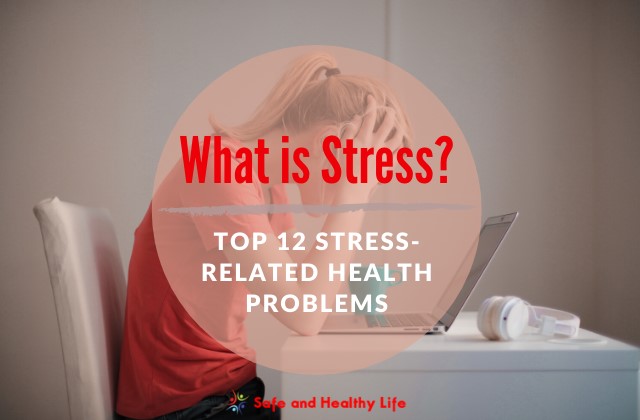What is Stress?
Stress is the body’s reaction to any change that requires an adjustment or response. Our body may react to these changes physically, mentally, and emotionally.
You can experience good or bad forms of stress from your environment, your body, and your thoughts. The human body is designed to experience stress and react to it. Stress is a normal part of life.
Positive stress is called “eustress.” This type of stress keeps us alert, motivated, and ready to avoid danger — like when a person is being given greater responsibilities or experienced job promotion.
While negative stress is known as “distress” — when a person faces continuous challenges without relief or relaxation between challenges. As a result of this kind of stress, the person becomes overworked and stress-related tension builds.
Some Warning Signs of Stress
Chronic stress can wear down the body’s natural defenses, leading to a variety of physical signs and symptoms which may include the following:
- Dizziness
- General aches and pains
- Grinding teeth, clenched jaw
- Headaches
- Indigestion or acid reflux symptoms
- Increase in or loss of appetite
- Muscle tension in neck, face, or shoulders
- Problems in sleeping
- Racing heart
- Cold and sweaty palms
- Tiredness, exhaustion
- Trembling or shaking
- Weight gain or loss
- Upset stomach
- Sexual difficulties
How Does Stress Affect Our Health?
The body’s autonomic nervous system has a built-in stress response that causes physiological changes to allow the body to combat stressful situations. This stress response, also known as the “fight or flight response“, which is activated in case of an emergency.
However, this response can become chronically activated during prolonged periods of stress. Prolonged activation of the stress response causes wears and tear on our body – both physical and emotional.
Stress also becomes harmful when people engage in the compulsive use of substances like alcohol, tobacco, or drugs to try to relieve their stress because these substances will just aggravate the stress level of the person.
Many people may even think that health problems are just the result of bacteria or viruses. What many people do not realize is that stress can also disable the body’s immune system to make you more susceptible to germs in the environment.
Many kinds of infirmities result from your immune system’s inability to function properly. Stress, especially the unrelenting kind for which there is no relief, can play havoc with your body’s ability to fight off microscopic invaders or to operate the way it is supposed to.
According to an expert, stress doesn’t only make us feel awful emotionally; it can also exacerbate just about any health condition you can think of. Stress isn’t only a feeling. It isn’t just in your head.
It’s a built-in physiologic response to a threat. When you’re stressed, your body responds. Your blood vessels constrict. Your blood pressure and pulse rise. You breathe faster.
Your bloodstream is flooded with hormones that can become harmful to your body with prolonged overexposure.
The following are some of the most significant health problems related to stress:
1. Heart disease
Stress can directly increase heart rate and blood flow and causes the release of cholesterol and triglycerides into the bloodstream. Over time, serious stress can damage the heart with increased wear and tear for the reasons just mentioned.
According to doctors, sudden emotional stress can be detrimental to heart health, including heart attacks. People who have chronic heart problems need to avoid acute stress and must learn how to successfully manage life’s unavoidable stressors as much as they can.
2. Asthma
Research has also shown that the body’s response to stress triggers the immune system and causes the release of certain hormones. This can lead to inflammation within the airways of the lungs, triggering the onset of asthma attacks.
3. Obesity
Based on the results, the researchers suggest long-term stress — as determined by cortisol levels in hair – may raise the risk of obesity. These results provide consistent evidence that chronic stress is associated with higher levels of obesity.
Individuals who had persistently high levels of the stress hormone, “cortisol”, over long periods of time weigh more, had a higher body mass index (BMI), and larger waistline compared with those who had low levels of the hormones.
4. Diabetes
Stress is a potential contributor to chronic hyperglycemia in diabetes. Stress has long been shown to have major effects on metabolic activity. Energy mobilization is a primary result of the fight or flight response. Stress stimulates the release of various hormones, which can result in elevated blood sugar levels.
5. Headaches
Headaches are more likely to occur when you’re stressed. Stress is considered one of the most common triggers for tension-type headaches and migraine and can trigger other types of headaches or make them worse, too.
6. Burnout
Burnout is a state of emotional, physical, and mental exhaustion caused by excessive and prolonged unrelenting stress. It occurs when you feel overwhelmed, emotionally drained, and unable to meet constant demands.
If constant stress has you feeling helpless, disillusioned, and completely exhausted, you may be on the road to burnout. And as the stress continues, you begin to lose interest and motivation.
7. Gastrointestinal problems
In surveys, it is identified that stress is a common trigger for the majority of the people who suffer from acid reflux or gastroesophageal reflux disease (GERD), chronic heartburn.
This is a condition where the stomach has an increased production of acid which refluxes back into the esophagus.
8. Alzheimer’s disease
Researchers believe that stress can cause inflammation in the brain, making the brain more susceptible to health problems like dementia. Stress can also lead to depression, a known risk factor for Alzheimer’s and related forms of the disease.
9. Cancer
More and more studies are showing links between stress and various types of cancer. There is some evidence that stress can have an effect in a patient with existing cancer by speeding up tumor growth and metastasis. Metastasis occurs when cancer spreads from its initial location.
10. Depression, Anxiety and Panic Attacks
Emotional stress can play a role in causing depression, anxiety disorders, and panic attacks. People who struggle with ongoing situations that make them feel uneasy may experience high levels of stress that can manifest in nervousness and fear, seemingly for an unknown cause.
11. Colds and flu
Physical illnesses caused by stress may be as common as the garden variety of colds or seasonal flu. People who are stressed often have immune systems that are not functioning properly. Consequently, they can get sick faster and easier than they otherwise might.
12. Circulatory problems
Stress can make your body’s arteries and veins tighten up in response to the fight or flight response. This compression can reduce blood flow throughout the body and create problems like blood clots, poor circulation, or even strokes.
Do not let stressful situations continue to cause problems with your immune system and perhaps lead to one of the common illnesses caused by stress. Related.
Learn how to take steps now to manage stressful factors in your life before stress takes control of you.
About The Author:
Carla Smith is the founder of SafeandHealthyLife.com. Her main objective is to provide informative articles, reviews, and analysis of health & fitness topics to her readers that help them to make their life easier and happier. Connect with her on Twitter.





